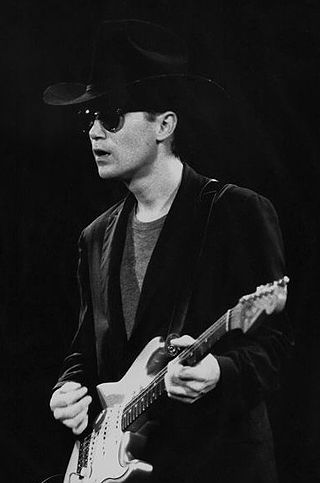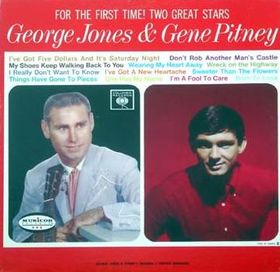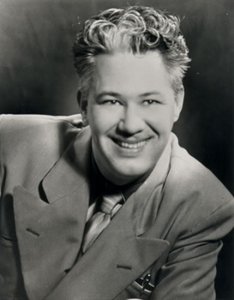Related Research Articles

Gene Francis Alan Pitney was an American singer, songwriter and musician.

Marshall Howard Crenshaw is an American musician, singer, songwriter, and guitarist best known for hit songs such as "Someday, Someway," a US top 40 hit in 1982, "Cynical Girl," and "Whenever You're on My Mind." He is also the co-author of one of the biggest radio hits of the 1990s, the Gin Blossoms's "Til I Hear It from You." His music has roots in classic soul music and Buddy Holly, to whom Crenshaw was often compared in the early days of his career, and whom he portrayed in the 1987 film La Bamba.

William Orville "Lefty" Frizzell was an American country and honky-tonk singer-songwriter.

Pauline Matthews, better known by her stage name Kiki Dee, is an English pop singer. Known for her blue-eyed soul vocals, she was the first female singer from the UK to sign with Motown's Tamla Records.

Eddie Lee Floyd is an American R&B and soul singer and songwriter, best known for his work on the Stax record label in the 1960s and 1970s, including the No. 1 R&B hit song "Knock on Wood".
"I Got a Woman" is a song co-written and recorded by American R&B and soul musician Ray Charles. Atlantic Records released the song as a single in December 1954, with "Come Back Baby" as the B-side. Both songs later appeared on the 1957 album Ray Charles.

Anthology is the first compact disc to collect many of soul music icon Ray Charles' ABC-Paramount-era recordings. AllMusic considers it to be "the best single CD collection of Ray Charles' '60s and '70s ABC-Paramount material", while Rhino Records, the issuing label, refers to it in the liner notes as "the compact disc edition of Ray Charles' Greatest Hits", alluding to the two Rhino LPs issued the same year. It is one of the first CDs to be released by Rhino.

Melba Joyce Montgomery is an American country music singer and songwriter. She is known for a series of duet recordings made with George Jones, Gene Pitney and Charlie Louvin. She is also a solo artist, having reached the top of the country charts in 1974 with the song, "No Charge". Born in Tennessee but raised in Alabama, Montgomery had a musical upbringing. Along with her two brothers, she placed in a talent contest which brought her to the attention of Roy Acuff. For several years she toured the country as part of his band until she signed with United Artists Records in 1963.

George Jones Sings the Great Songs of Leon Payne is an album by American country music artist George Jones, released in 1971 on the Musicor Records label containing nine Leon Payne covers and one Jones co-write with Payne, "Take Me". Eight of the ten songs on this album had been released on earlier Jones albums. Of those eight, three were re-recorded in 1970 and included here, and the other five are just re-releases of the original 1960s recordings. The two previously unreleased songs, "Brothers of a Bottle" and "Lifetime to Regret", were also recorded in 1970. This was the last Jones "studio" album that was released by Musicor as he had already signed with Epic Records.

For the First Time! Two Great Stars – George Jones and Gene Pitney is an album by American country music artist George Jones and pop artist Gene Pitney. It was released in 1965 on the Musicor label in the United States and on the Stateside label in the United Kingdom.

Famous Country Duets is an album by American country music artist George Jones with Gene Pitney and Melba Montgomery. This album was released in 1965 on the Musicor Records label.

Sings from the Heart is the 1962 country music studio album released by George Jones in June 1962. The album was his eleventh studio LP release, and was his last with Mercury, after switching to United Artists in late 1961. The album's theme was listing of songs about the heart, and contains his last #1 with Mercury Records from 1961, Tender Years.
"I've Got Five Dollars" is a 1931 popular song composed by Richard Rodgers, with lyrics by Lorenz Hart for the musical America's Sweetheart (1931) where it was introduced by Harriette Lake and Jack Whiting.

"You're My Favorite Waste of Time" is a song written and first released by American singer Marshall Crenshaw. His 1979 home demo of the song was released as the B-side of his 1982 hit "Someday, Someway" and is available on his compilations The 9 Volt Years and This Is Easy: The Best of Marshall Crenshaw.

Theron Eugene "Ted" Daffan was an American country musician noted for composing the seminal "Truck Driver's Blues" and two much covered country anthems of unrequited love, "Born to Lose" and "I'm a Fool to Care".

"Love Bug", also spelled "Lovebug," is a song by American country music artist George Jones. Jones' version, which also features a young Johnny Paycheck on backup vocals and draws heavily from the Bakersfield sound as popularized by Buck Owens, reached #6 on Country Songs|Hot Country Singles]] chart in 1965. It was released on his July 1965 New Country Hits album and then re-released as the lead song for his 1966 album of the same name, Love Bug.

Mary Jean & 9 Others is the fourth album by singer-songwriter Marshall Crenshaw. The album was produced by Don Dixon and features a return to the sounds of Crenshaw's earlier work after the country rock excursion of his previous album, Downtown.
"Things Have Gone to Pieces" is a song written by Leon Payne and originally recorded by country music artist George Jones. It was Jones' first single after signing with the Musicor label and spent a total of twenty-one weeks on the Billboard survey, peaking at #9 in 1965. It was a solo that Jones released on his 1965 album with Gene Pitney, For the First Time! Two Great Stars - George Jones and Gene Pitney.
"That's All It Took" is a song written by George Jones, Darrell Edwards, and Charlotte Lynn Grier and originally recorded by Jones as a duet with Gene Pitney on Musicor Records. Jones and Pitney had scored a Top 20 hit in 1965 with "I've Got Five Dollars and It's Saturday Night" and also recorded two LPs together. However, "That's All It Took" was not a hit, only making it to number 47 on the Billboard country singles chart. Although a rather obscure song, country-rock pioneer Gram Parsons recorded the song as a duet with Emmylou Harris on his debut solo album GP in 1973. A live version by Parsons and his band the Fallen Angels also appears on the 1982 release Live 1973.

"Someday, Someway" is a 1982 song by American rock musician Marshall Crenshaw. The song was released on his 1982 debut album, Marshall Crenshaw.
References
- ↑ Murray, Noel (21 January 2013). "Marshall Crenshaw on songwriting, covers, and the album cover he absolutely hates". The AV Club. Archived from the original on 31 January 2019. Retrieved 30 January 2019.